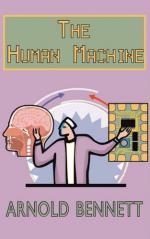And the whole secret of relative freedom from financial anxiety lies not in income, but in expenditure. I am ashamed to utter this antique platitude. But, like most aphorisms of unassailable wisdom, it is completely ignored. You say, of course, that it is not easy to leave a margin between your expenditure and your present income. I know it. I fraternally shake your hand. Still it is, in most cases, far easier to lessen one’s expenditure than to increase one’s income without increasing one’s expenditure. The alternative is before you. However you decide, be assured that the foundation of philosophy is a margin, and that the margin can always be had.
XVI
REASON, REASON!
In conclusion, I must insist upon several results of what I may call the ‘intensive culture’ of the reason. The brain will not only grow more effectively powerful in the departments of life where the brain is supposed specially to work, but it will also enlarge the circle of its activities. It will assuredly interfere in everything. The student of himself must necessarily conduct his existence more and more according to the views of his brain. This will be most salutary and agreeable both for himself and for the rest of the world. You object. You say it will be a pity when mankind refers everything to reason. You talk about the heart. You envisage an entirely reasonable existence as a harsh and callous existence. Not so. When the reason and the heart come into conflict the heart is invariably wrong. I do not say that the reason is always entirely right, but I do say that it is always less wrong than the heart. The empire of the reason is not universal, but within its empire reason is supreme, and if other forces challenge it on its own soil they must take the consequences. Nearly always, when the heart opposes the brain, the heart is merely a pretty name which we give to our idleness and our egotism.
We pass along the Strand and see a respectable young widow standing in the gutter, with a baby in her arms and a couple of boxes of matches in one hand. We know she is a widow because of her weeds, and we know she is respectable by her clothes. We know she is not begging because she is selling matches. The sight of her in the gutter pains our heart. Our heart weeps and gives the woman a penny in exchange for a halfpenny box of matches, and the pain of our heart is thereby assuaged. Our heart has performed a good action. But later on our reason (unfortunately asleep at the moment) wakes up and says: ’That baby was hired; the weeds and matches merely a dodge. The whole affair was a spectacle got up to extract money from a fool like you. It is as mechanical as a penny in the slot. Instead of relieving distress you have simply helped to perpetuate an infamous system. You ought to know that you can’t do good in that offhand way.’ The heart gives pennies in the street. The brain runs the




